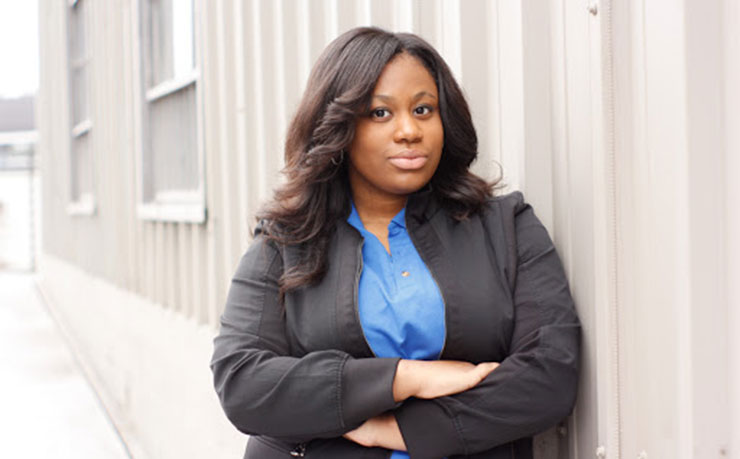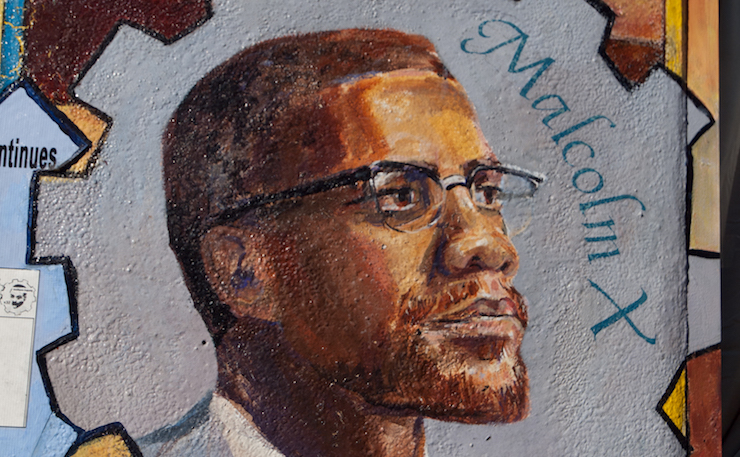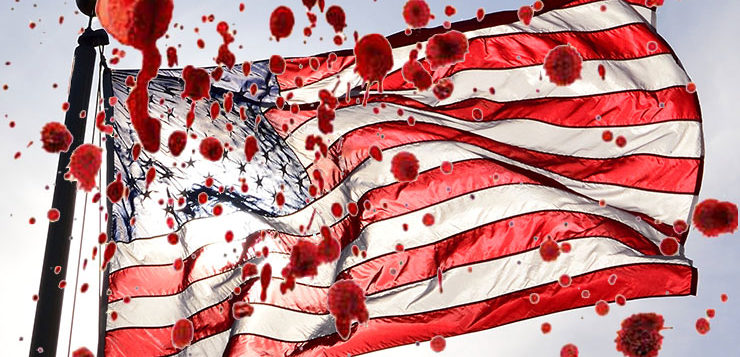Violence is never the answer… except when it is. Julian Cola delves into the world of US politics at home and abroad, and the breathtaking contradictions its leaders refuse to see.
The CNN building was “defaced”. Stores were looted. Edifices were engulfed in flames in Atlanta’s downtown region. Forever put to “shame” was the civil rights movement. George Floyd’s public lynching by policemen in Minneapolis had unnerved Black youths and now it was as if the mother of all riots had been unleashed across America.
Atlanta’s mayor, Keisha Lance Bottoms, made sure to rise above the moment at a press conference on May 29th. “This is not a protest. This is chaos…. If you want change then register to vote,” her voice crescendoed. “Go out and vote in November! That’s how change is made in America!” Twenty-four hours later, university students Messiah Young (22) and his girlfriend Teniyah Pilgrim (20) were caught in traffic following a protest in downtown Atlanta. Policemen shattered the driver’s side window of their car and tased the couple. Both were violently dragged from the vehicle and detained.
Young suffered a fractured arm and a gash requiring 24 stitches.
Less than two weeks later, Rayshard Brooks, the father of three daughters and a stepson, was fatally shot by an Atlanta policeman in a Wendy’s parking lot.
The coveted electoral date of change so proudly mentioned by the mayor couldn’t come sooner.
While CNN’s editor-at-large, Chris Cillizza, characterized Lance Bottoms’ lividness as being, “what so many black Americans were feeling at the moment,” her presence serving as the “face and voice of her party (Democrats) amid protest and chaos,” the country in which she lives garrisons the world.
In 2018, US military bases were located in 80, and some 200,000 American troops were stationed on every continent, save Antartica. Politicians and media pundits jostle before the cameras in a frantic bid to exalt the virtue of peaceful protests and denounce riotous troublemakers.
Of course, the mere thought of a peaceful America can only serve as a case study into parallel words. Thanks to bipartisan support, the 2020 US military budget stands at an estimated $934 billion dollars. In fact, since 9/11, US taxpayers – George Floyd included – have flipped a $6.4 trillion dollar bill for military action and wars in the Middle East and Asia. Nevermind expenditures to maintain the United States Africa Command (AFRICOM) or its sizable military footprint in Asia, Latin America and Europe.
As part of its overseas contingency operations, the Department of Defense has spent a whopping $2 trillion dollars to fund the War on Terror since 2001.
Timbres Of War
The United States is renowned across the globe for flexing its military muscle and sanctioning countries that pose zero threat to its national security. Since its inception in 1776, it has been at war 225 out of 243 years. Meanwhile, its militarized police force operates with virtual impunity on the home-front, spilling the blood of black men, women, and children.
That’s to say, Uncle Sam’s structural racism and hegemony, remains two peas of the same pod. The overwhelming success of the former has driven the audacity of US foreign policymakers and corporations in their quest, albeit waning, for global domination. Included in this bunch, by omission or commission, are the black bourgeoisie and political class.
Regaining control of a narrative of peaceful protests, however, is proving ever more difficult. Their country has been at war 92 percent of the time since its inception and the weapons and tactics used abroad are now employed within US borders.
The child who is not embraced by the village will burn it down to feel its warmth.
– African proverb
Corporate US media is quick to point out that protestors who’ve taken to the streets following the public lynching of Big Floyd fall under one of two categories. Peaceful protestors (the good). Or riotous black youths (the bad). Of Sanskritic origin, the word ‘loot’ was incorporated into the Hindi language when the Union Jack flew over India. The term was employed by British settlers, not for purposes of self-reflection, but rather, according to Vazira Zamindar, as an outward label to characterise participants in the first rebellion against the East India Company in 1857 as rapists and looters.
Like Bottoms, John Harrington, head of Minnesota’s Department of Public Safety, also saw fit to raise his voice at a press conference just days after Big Floyd was murdered.
“While that we will always, and I repeat always, respect everyone’s first amendment rights, those rights stop when a molotov cocktail is thrown into an open business. Those rights stop at the point that you loot the liquor store in the neighborhood. Those rights stop when you loot the gas station, the little mom and pop gas station in the neighborhood.”
His was a morbidly asinine statement, especially coming from a Black man. Far from having looted a dime or thrown a match, David McAtee (53), the owner of a popular BBQ eatery who often fed policemen free-of-charge, was shot dead by a national guardsman on June 1 amid protests against police violence.
Such ominous threats, whether Harrington is cognizant of the gravity of his statements or not, were previously echoed in the dark chambers of a not-too-distant past. To what degree that history reflects the present moment is open for debate, but it is no secret that oppressed communities in the United States have long voiced their experiences living under American fascism.
“One of the most striking Nazi views was that Jim Crow was a suitable racist paradigm in the United States because American blacks were already oppressed and poor,” author James Q. Whitman writes in ‘Hitler’s American Model’. To what extent, if at all, “American blacks” benefitted from citizenship rights if they were systematically “oppressed” and rendered “poor” by US legislation is the unanswered question. “But then in Germany, by contrast, where the Jews (as the Nazis imagined it) were rich and powerful, it was necessary to take more severe measures.”

Speaking to reporters a day after Atlanta policemen murdered Rayshard Brooks, activist Mary-Pat Hector told reporters that “it’s obvious that black people can’t even go in their black neighborhoods and just be…. The police feel like we don’t have any rights… but the fact that (Atlanta’s) mayor would get on the news and talk about this being a black city with black leadership, yet this black leadership does not stand up for us.”
While acknowledging that Mr Brooks was killed by “white officers”, she reiterated that “Atlanta does have black leadership. But we’re not just fighting against white racist cops. We’re fighting against black cops too. We’re fighting against the system.”
Battle For Narrative Amid Bombs And Sanctions
Venezuelan Vice-President, Delcy Rodriguez, pointed out at last year’s UN General Assembly that “it is well-known that the use of armed force by the US industrial complex is a business. The last three presidents of the US increased illegal bombings. By not obtaining authorization from the Security Council, they violated the charter of the United Nations.
During the period between 2001 and 2009 president George W. Bush launched 70,000 bombs. This is an average of 24 a day. Between 2009 and 2017, under the leadership of president Barack Obama, the US government launched 100,000 bombs, a daily average of 34. During the most recent data of Donald Trump, 44,096 bombs were launched, which broke the record with an average of 121 a day. These bombs have led to suffering of civilian populations, indiscriminately affecting children, adults and seniors.”
Ninety-nine years ago, Greenwood (Tulsa-Oklahoma), the wealthiest Black community in the United States at the time, fell victim to some of those bombs, as well as a raging mob of white men. Most were recent returnees from WWI. Survivors of the attack recalled six aircraft circling the community in the wee hours of June 1, 1921. Incendiary bombs suddenly fell over Greenwood.
“Prominent city officials,” according to an article published by the Chicago Defender in October 1921, had ordered the squadron to bomb the black community.
Dubbed the Tulsa Race Riots, some 300 people, mostly Black men, women and children were killed and approximately 10,000 people were left homeless. “I refuse to call it a riot because it was really – you know – whites had decided to burn down the homes of 10,000 people,” recalled Olivia Hooker, a survivor. “So that was not a riot. It was a planned desecration.”
Shunned by historians for decades, an Oklahoma state commission was formed in the late 1990s to officially document the bloodletting and destruction.
You can’t understand what is going on in Mississippi if you don’t understand what is going on in the Congo…. They’re both the same.
– Malcolm X, 1965
Sanctions are another foreign policy weapon used by the United States to pressure countries they deem as “rogue.” Vijay Prashad notes that the objectives of sanctions are broadly all the same – that the United States will suffocate a country’s ability to trade and access finance as long as it does not do what the United States of America asks it to do. Cuba, Iran, North Korea, Sudan, Syria and Venezuela, though they have never attacked or posed a threat to the United States, currently comprise the list of “rogue” states or regimes.
Number one on the list is the small Caribbean island just 90 miles south of Florida. For well over half a century, Cuba has bore the brunt of US sanctions and an impetuous economic blockade.
In November 2018, Cuba’s Minister of Foreign Affairs, Bruno Rodriguez, called the embargo an “act of genocide… an act of oppression and an act of war” one that amounted to $933,678 billion in economic losses.
Although 187 out of 192 UN Member States voted for an end to the US economic embargo against Cuba at last year’s UN General Assembly, those measures remain firmly in place.
For the black community in the United States, a group Malcolm X referred to as an “internal colony,” sanctions are the equivalent of red-lining, the subprime mortgage scandal, untold acres of land seized from Black farmers and rural landowners, and the summation of effects incurred through the legacy of chattel slavery.

In 1920, 14 percent of all farms in the US, representing approximately 925,000 farms, were owned by the Black community. That number, however, would drastically decrease over the 20th century, where some 600,000 Black farmers were forced off their lands. The Nation reported that by 1975, only 45,000 Black-owned farmers remained.
In 2001, the US Agricultural Census reported that an estimated 80 percent of Black-owned farmland in the south had been appropriated through unscrupulous partition sales.
By 2017, just two percent of all farmers in the United States and only one percent of rural land was owned by Black people.
“The (US) government judges us. It has thermometers that don’t even exist for themselves when it comes to measuring democracy, and yet they judge us,” Rodriguez concluded.
Talks Of Peace Through The Vastest Of Armies
2020 is a US presidential election year and the nationwide protests have provided fodder for the political elites across party lines. While US president Donald Trump played bad cop, telling governors to “dominate” the protestors or else “you’ll look like a bunch of jerks,” his predecessor took a more diplomatic tone.
Writing on Medium, Barack Obama stated: “Let’s not excuse violence, or rationalize it, or participate in it. If we want our criminal justice system, and American society at large, to operate on a higher ethical code, then we have to model that code ourselves.” Again, this message is for, in the words of his successor, a bunch of street “thugs,” not Uncle Sam’s military industrial complex.
Alloyed by Wall Street, Hollywood, death chambers, the War on Drugs, Ivy League schools, corporatized healthcare, the elite one percent, Indian reservations, the ghost of George Stinney Jr. and now George Floyd, America carries the imprudent burden of itself. Genuine insincerity. Technological advancement amid social backwardness and retardation. Piously pornographic.
All things considered, it’s in this space of untold contradictions that the maestro of war, sanctions and embargoes stands at the pulpit preaching the gospel of peace, something to which it has no relation or understanding.
Donate To New Matilda
New Matilda is a small, independent media outlet. We survive through reader contributions, and never losing a lawsuit. If you got something from this article, giving something back helps us to continue speaking truth to power. Every little bit counts.




